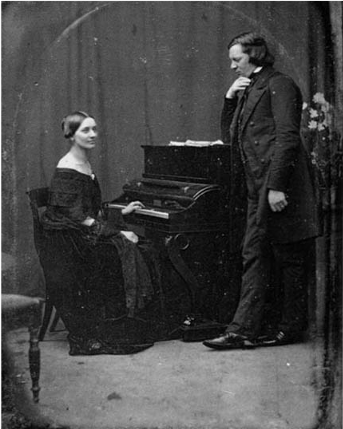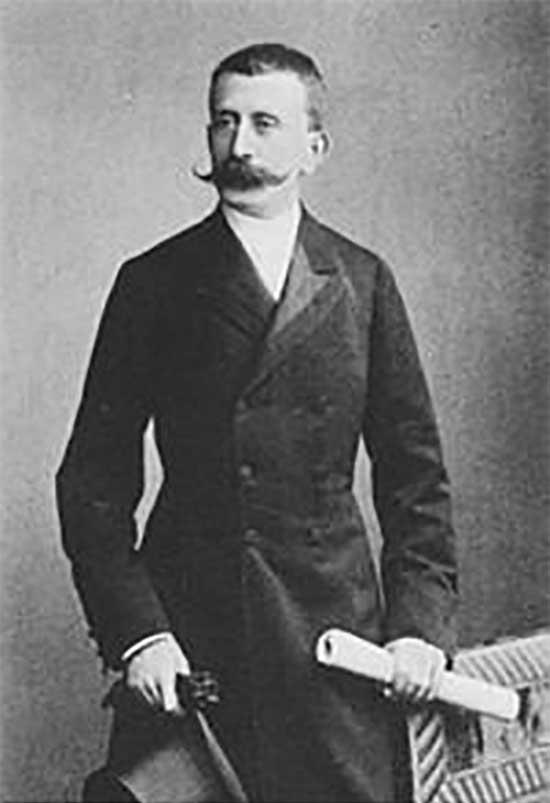The Gutenberg Project has made available to the general public many rare and obscure literary works. One such trinket is Advice to Young Musicians by composer and writer Robert Schumann (1810-1856). Schumann is an eccentric and interesting figure in Western music, known today for his varied output of lieder (songs), piano works, orchestral compositions and music criticism.
The increasing recognition of his wife Clara Schumann for her innovations in piano performance has also brought Robert back into the spotlight. Clara Wieck was a child prodigy, trained by her musical parents. Her performance career lasted over sixty years and was highly influential in shaping the modern repertoire and concert program.
Clara was the first to perform without sheet music, playing in front of large audiences entirely from memory. Robert owed a lot to Clara for promoting his music. He planned on becoming a concert pianist himself but injured his hand, allegedly trying to strengthen it with a weird contraption known as the ‘finger box’. So he did the next best thing. Married his piano teacher’s daughter.
In 1831 Schumann published his first article, “Ein Opus II” (An Opus II) in the Allgemeine Musikalische Zeitung (General Musical Newspaper), a poetic review of Chopin’s variations on Mozart’s ‘Là ci darem la mano’ from Don Giovanni. It contains Schumann’s most famous utterance when in the character of Eusebius he proclaims, “Hats off gentlemen, a genius.”
In 1834, as far as his writing was concerned, Schumann decided he needed more editorial control, so he established a journal called Die Neue Zeitschrift Fur Musik (The New Magazine for Music) in partnership with his friend Ludwig Schuncke and his teacher Frederick Wieck. Schuncke tragically passed away less than a year later.
The magazine thrived, drawing attention to emerging talent like Hector Berlioz, on whom Schumann lavished six consecutive articles analysing the Symphony Fantastique.
In 1844, Schumann handed over editorship of the magazine to Franz Brendel. Under Brendel’s watch, an article by K. Friegedank appeared in 1850. “Das Judenthum in der Musik” was authored by none other than Master of Pomposity Richard Wagner, who could only criticise composers Felix Mendelssohn and Giacomo Meyerbeer for being Jewish behind a pseudonym. Friegedank means free thought. Wagner would love to be living in today’s society, where people can vent their prejudices on social media behind anonymous profiles.

It is unclear how, or even if, Robert Schumann reacted to Brendel’s and Wagner’s racism. He probably had better things to think about, like advice to young musicians.
In 1848, Schumann released Advice to Young Musicians as a counterpart to his piano anthology Album für die Jugend (Album for the Young). Here he draws on his life experience in considering how best to nurture talent.
First he stresses the ear:
“The cultivation of the Ear is of the greatest importance.—Endeavour early to distinguish each several tone and key. Find out the exact notes sounded by the bell, the glass, the cuckoo, etc.”
I received interval training at high school from our music teacher, Paul Weir. He taught us to recognise a perfect fourth as the opening interval from Wagner’s Bridal Chorus. A perfect fifth is the opening interval of the Star Wars title theme. Doorbells and train announcement systems often use a sixth that resolves to a fourth. Recognising these key intervals will give you a solid foundation for interpreting music. Interval knowledge is important for all musicians. Singers often know intervals intuitively, but being able to distinguish them clearly can only add to their control and depth of expression.
Schumann next emphasises the importance of scales, but warns against over-practise of exercises. I agree. Scales are a must for beginners. Advanced players may warm up with scales for five or ten minutes. I often revise scales when I encounter passages that could use some technical revision.
Instead of scales you can practise etudes. The best etudes aren’t just studies but performance pieces in their own right. Chopin’s etudes, while formidably difficult, are a great way to enhance technique. Even if you never master them, the technique acquired is valuable for both the classical and jazz pianist. Also explore the well crafted etudes of Moritz Moszkowski and Ignaz Moscheles. My mother had Czerny’s School of Velocity (Die Schule der Geläufigkeit). Practising Czerny etudes is equivalent to be being whipped by a cane – it shouldn’t be allowed.

Schumann’s views on facial hair are unknown. But when it comes to playing in time, Schumann is uncompromising. “Play strictly in time! The playing of many a virtuoso resembles an intoxicated person.” I have never seen virtuosos play intoxicated. I have seen many robot prodigies play with mechanical efficiency. Expressive playing requires a tug of war with time. Sometimes technical demands require us to alter the tempo.
But Schumann becomes even more uncompromising.“Never jingle! Play always with energy and never leave a piece unfinished.” That’s easy for him to say. His wife did all the playing while he leant over the piano. As for jingling, it’s a great way to acquire the art of improvisation.
“Endeavour to play easy pieces well and with elegance; that is better than to play difficult pieces badly.” Mr Schumann, why play easy pieces if they’re boring? Difficult pieces are more challenging, more interesting. Jazz pianists can raise their technique by practising anything. And finishing what you’ve started is not realistic if the toasted sandwiches are ready or a huntsman spider has just entered the living room.
The difficulty of concert-grade pieces demands a commitment to musicality and technique, making these pieces great for study. Their technical demands often leave no time to look at the music. They must be memorised. This is a vital skill to acquire. Who knows when and where you’ll be summoned to play the piano?
“Take care always to have your instrument well tuned.” Good advice. An out of tune piano quickly tires the ear.
“You must be able to understand a piece of music upon paper.” Makes sense. Although maybe today he might add “and iPad.”
“When you play, never mind who listens to you.” Also good advice. I’m quite happy when anyone listens to me. In fact, I think I’ll get a cat.
“Think it a vile habit to alter works of good composers, to omit parts of them, or to insert new-fashioned ornaments. This is the greatest insult you can offer to Art.” Alright Robert, put those boxing gloves on, let’s sort this out in the ring. What if, like some of Chopin’s pieces, they were published posthumously? If the composer never published them, then it shouldn’t matter if we insert the odd ornament here and there, or remove entire passages, or add improvised sections. Am I making you mad Robert?
However Robert, I definitely agree with what you say next: “If all would play first violin, we could not obtain an orchestra. Therefore esteem every musician in his place.” We are all on a unique musical journey. Taste is also very subjective.
“As you grow up, become more intimate with scores (or partitions) than with virtuosi.” That’s easy for you to say Robert. I am already too intimate with my scores. They are scattered all over the floor, on my bed, in the bathroom. I am too intimate with my scores! I want some virtuosi.
“Let your intimate friends be chosen from such as are better informed than yourself.” Unfortunately I am already too smart for my own good. That makes following this advice hard.
“From vocalists you may learn much, but do not believe all that they say.”
Acknowledged.
“If Heaven has bestowed on you a fine imagination, you will often be seated at your piano in solitary hours, as if attached to it; you will desire to express the feelings of your heart in harmony, and the more clouded the sphere of harmony may perhaps be to you, the more mysteriously you will feel as if drawn into magic circles. In youth these may be your happiest hours. Beware, however, of abandoning yourself too often to the influence of a talent that induces you to lavish powers and time, as it were, upon phantoms. Mastery over the forms of composition and a clear expression of your ideas can only be attained by constant writing. Write, therefore, more than you improvise.”
That’s really good advice Bob and I wish you’d told me earlier. How many stunning improvisations have I lost to the winds, played for the ears of the gods only? And probably the petty gods.
But now, thanks the digital age, I can record an entire practise session. I am increasingly getting into the habit of doing this. The result has been Hannah’s Loss, a jazz piano improvisation, and Myth of Wu, a classical improvisation I orchestrated.
“Look deeply into life, and study it as diligently as the other arts and sciences.” Yep.
“The laws of morals are those of art.” Nope. To be fair, Friedrich Nietzsche was yet to arrive on the scene. On second thoughts, you might be right Robert. Nietzsche holds art in high esteem and in the Birth of Tragedy (1872) strongly advocates art as the only form of deliverance.
“There is no end of learning.” Yep.

“When you play, never mind who listens to you”… Such awesome advice!